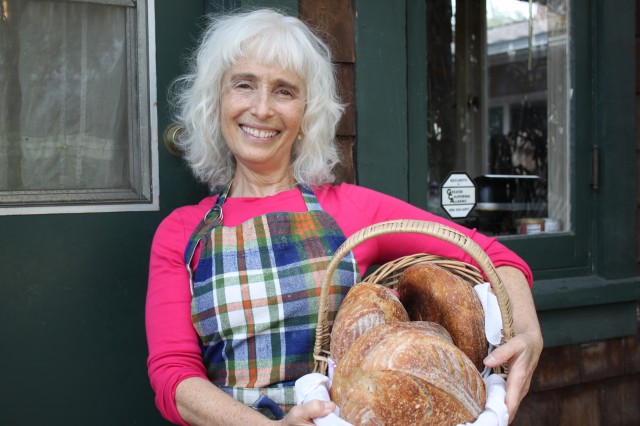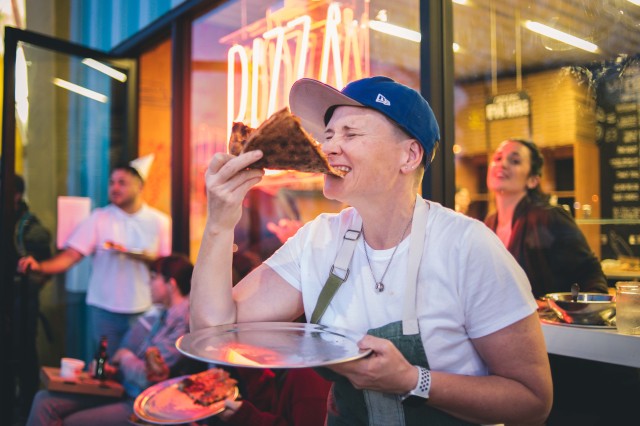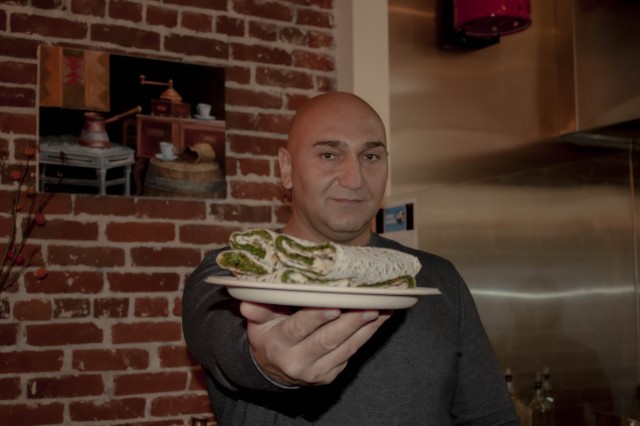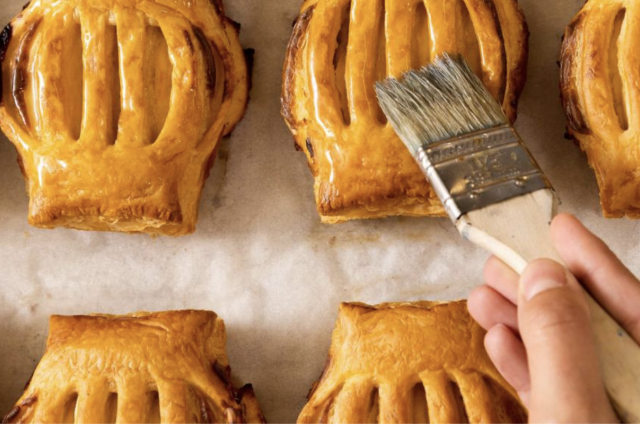
Past Meets Present in East L.A.
Edward Ramirez | La Princesita Tortilleria
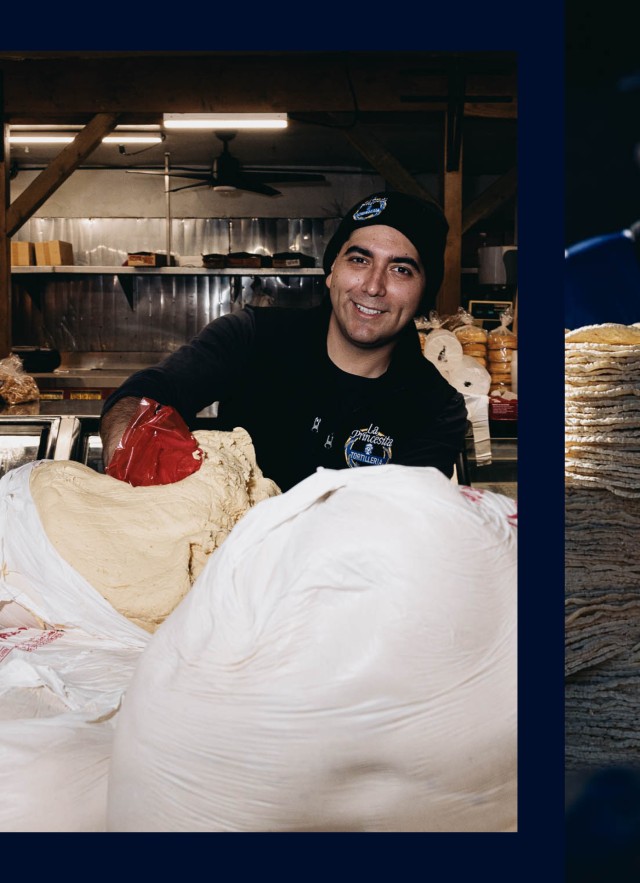
Kneaded: L.A. Bread Stories celebrates Los Angeles’ history, heritage, and communities through the lens of bread.
What started out as a small family business has grown into a cultural mainstay in East L.A. over the last 50 years. Edward Ramirez, along with his sister Monica and brother-in-law Enrique, has picked up where their father left off and continues to provide a taste of home and history to the Mexican-American community in the Los Angeles area today.
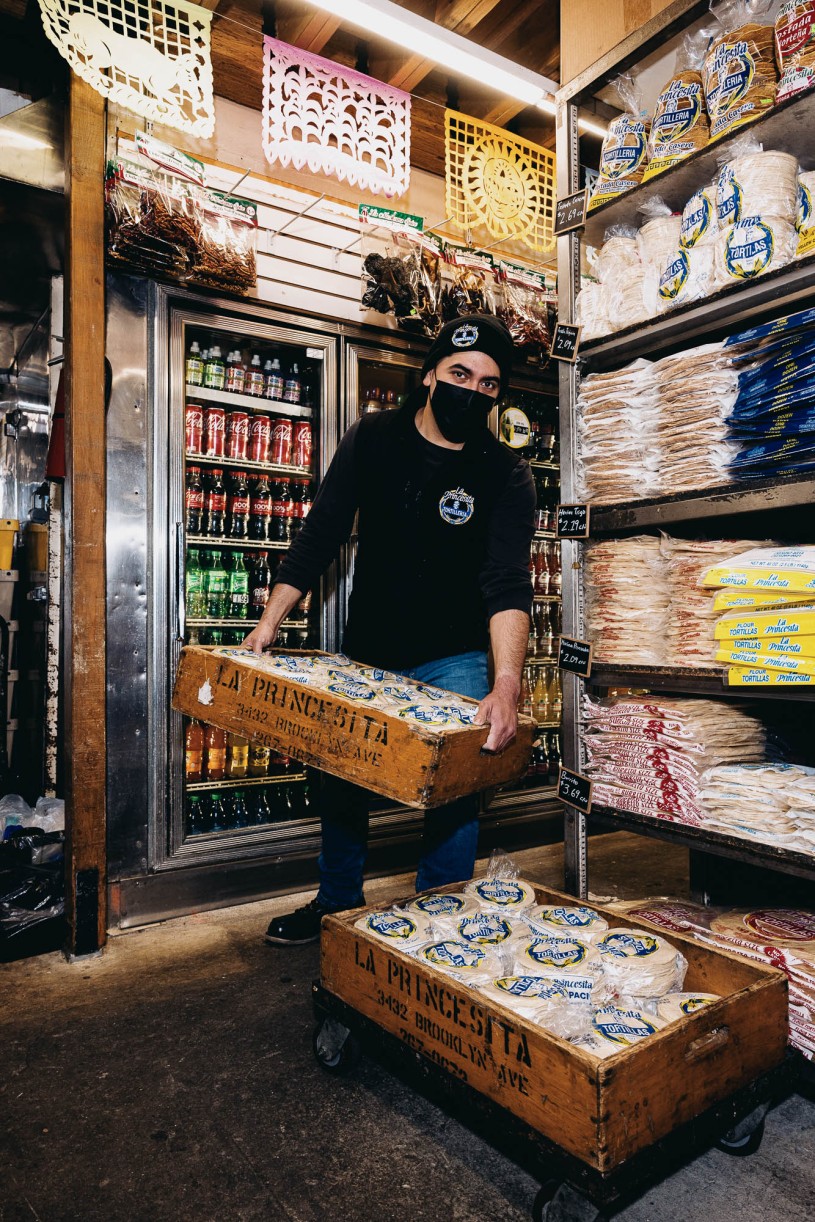
We try to keep it as authentic and traditional as possible. Yes, there is a little machinery involved, but we try to keep it traditional by using the same ingredients, materials, and techniques that our ancestors used—as authentic as you could get, and I'm very proud of that.
Edward Ramirez
Tell us about yourself and how you got started in the kitchen.
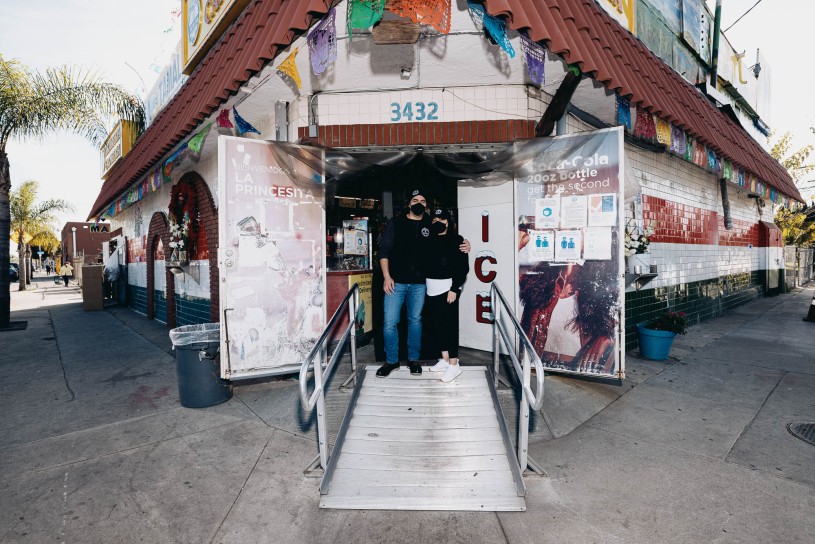
I grew up in East L.A., and I am in this career because of my family’s legacy. My father opened La Princesita Tortilleria in 1972, and at some point, all five of my siblings have worked here helping my dad out. I knew from an early age that I wanted to keep our family business going, so after high school, I attended Cal State Los Angeles, majoring in Business and Accounting. After graduation, I knew I wanted to work full-time to grow the business alongside my sister, Monica, and my brother-in-law, Enrique. I’ve been doing that ever since.
How did La Princesita Tortilleria get its start?
When my family immigrated here, they saw an opportunity to open a tortilleria. There weren’t any in the area, so there definitely was an untapped market. Finding traditionally made tortillas in L.A. was a challenge back then, and my family wanted to offer that to the community since it wasn’t available at the grocery store. It was important to my father to provide the community with a product that was unique and authentic to his culture.
La Princesita grew out of a tortilleria that my uncle started and was where my father spent his nights working making the tortillas. Back then, he would buy the tortillas from his brother and resell them to local grocery stores and restaurants—you know, he looked for any outlets to sell. When he realized his brother was struggling to keep the business afloat, he said, “Hey, let me buy it. I think I might be able to take the business in the right direction.” His brother accepted his offer and with money he had been saving up, my father invested in a second-hand machine that allowed him to increase production. He slowly started adding additional grocery products and authentic Mexican food items like chicharon—which we freshly fry on the spot. Eventually, he added the carnicería which is like a more traditional Mexican butcher shop. Today, we are focusing on growing and making connections with new vendors, suppliers, distributors, and working with other restaurants.

What makes La Princesita Tortilleria unique?
At La Princesita, we try to keep it as authentic and traditional as possible. For example, we use a machine to grind the maíz (corn), but our molino (corn-grinding machine) is unique because it has the same types of volcanic grinding stones that our ancestors would have used. We are taking things a step further and working with heirloom maíz. This maíz is from Mexico and hasn't been crossbred like the corn in the U.S. This Mexican maíz is the same that our ancestors used for generations—it's quite beautiful and makes me very proud of what we are doing here.
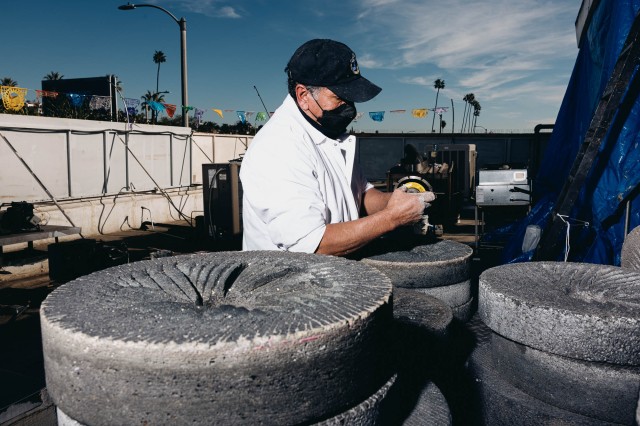
Maintaining, cleaning, and sharpening the volcanic stones used to grind the maíz is not something anyone can do—it’s a specialized skill and art.
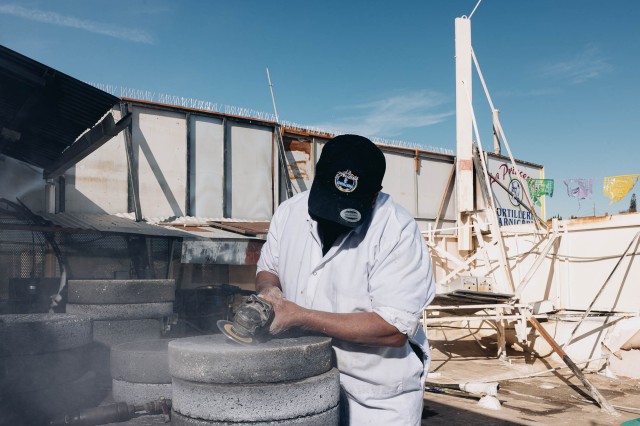
During the busy times of the year, the stones need to be sharpened at least once a week. It can be a dangerous job as shards of stone spray off the wheel.
1 of 1
Maintaining, cleaning, and sharpening the volcanic stones used to grind the maíz is not something anyone can do—it’s a specialized skill and art.
During the busy times of the year, the stones need to be sharpened at least once a week. It can be a dangerous job as shards of stone spray off the wheel.
What processes do you use that set La Princesita’s tortillas apart from the rest?
What sets us apart from others, like the big grocery store brands, is the process of nixtamalización—they skip this step and pack the tortillas with preservatives. The nixtamalization process involves boiling the corn kernels in water and lime solution. We let the maíz steep overnight so they can absorb all of those vitamins and minerals from the water and lime solution. After that, the corn kernels are drained and rinsed to remove the pericarp (outer kernel cover).
[Skipping nixtamalization] is a cheaper way of doing things, but it steps away from the traditional way of making tortillas. We keep it as authentic as possible and you can taste the difference.
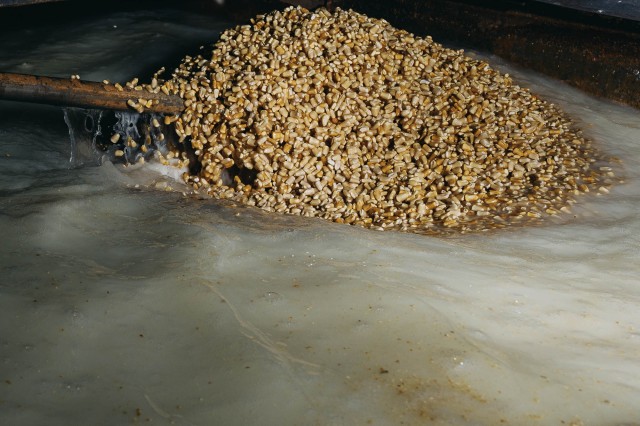
Corn kernels soaking in the alkaline solution of water and lime.
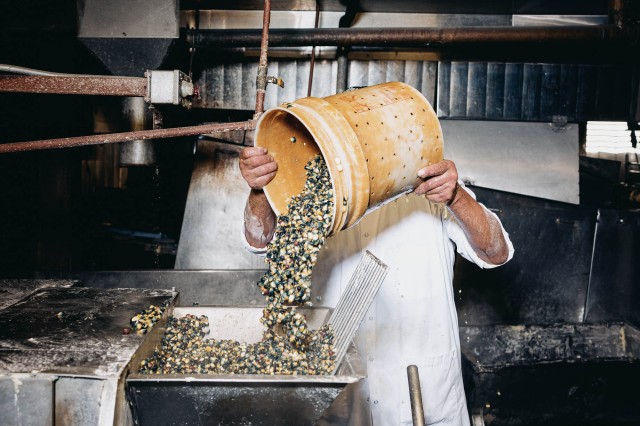
After nixtamalización, the maíz is poured into the molino to grind down the maíz.
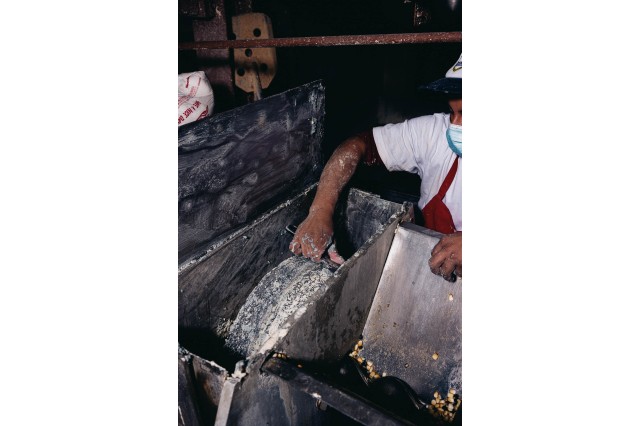
The volcanic stones used in traditional Mexican tortilla-making are thoughtfully incorporated into these modern grinding machines.
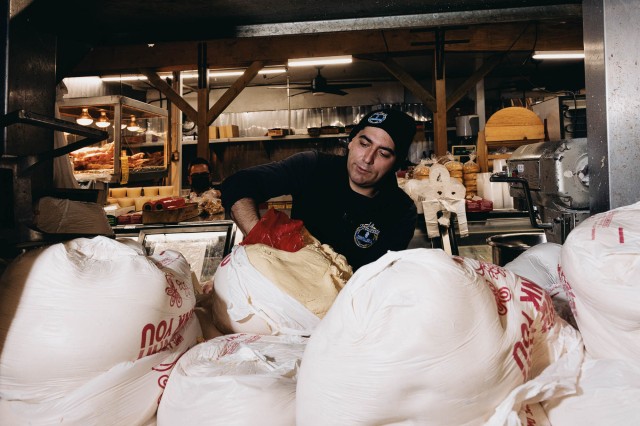
Edward works with the bags of tortilla dough ready to be shaped.
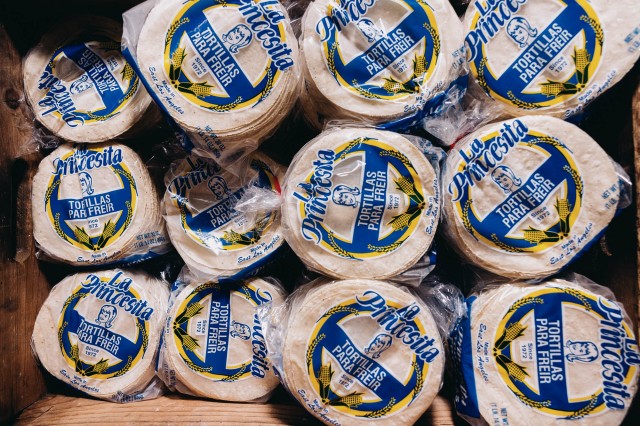
The final product is packaged fresh and ready to enjoy.
1 of 1
Corn kernels soaking in the alkaline solution of water and lime.
After nixtamalización, the maíz is poured into the molino to grind down the maíz.
The volcanic stones used in traditional Mexican tortilla-making are thoughtfully incorporated into these modern grinding machines.
Edward works with the bags of tortilla dough ready to be shaped.
The final product is packaged fresh and ready to enjoy.
How do tortillas bring people in the community together?
Well, food always helps to bring people together, and tortillas have been a staple in Mexican cuisine for generations. Our tortillas are a little taste of home and the continuation of our cultural traditions. When I take a bite out of that tortilla, it connects me to my ancestors. Our tortilleria is “the place” for so many families in the area, and I love it when our customers share things like, “I’ve been coming here since I was a kid” or “I came all the way from the Inland Empire for these.” Some customers even admit to making the trip out here to buy our tortillas and resell them to their community.
I noticed recently that it’s not just our community that's been bonded together from our tortillas—it's in other cultures too. We sell our tortillas to a Thai restaurant that wanted to do a taco Tuesday—and there was a chef experimenting with Mexican-Jewish fusion food. Bringing different cultures together is quite beautiful to see, and it’s so awesome that our tortillas do that.
What does running your family business and working with your family mean to you?
It means a lot! Sometimes we butt heads, but we get past that. We work hard, and during the holidays, we pretty much have no days off–but I feel like we get each other and we have a mutual understanding of where we want the business to go.
My dad is not with us anymore, but I think of him often. I remember as a child, he would show me around the tortilleria, explain what things did, and teach me the production process. Today, I think about those moments when I am running production. It keeps me close to him, and even though he's not here, I feel like he's right next to me.
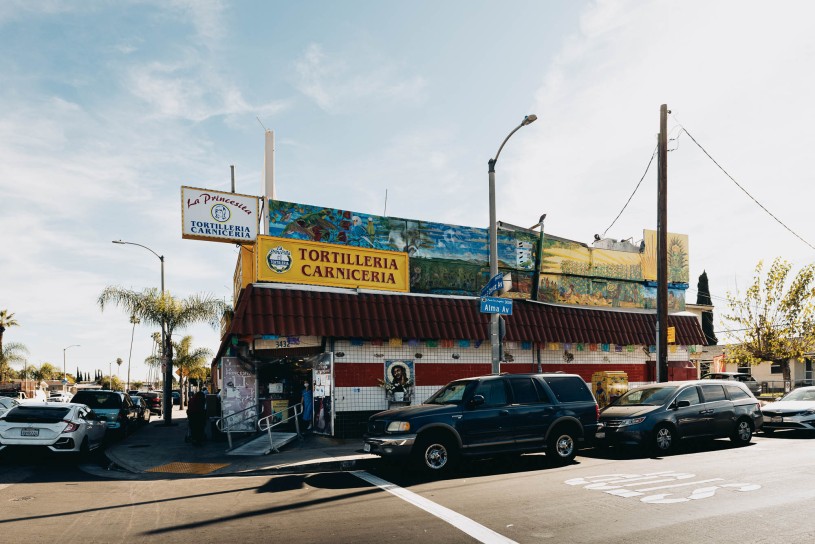
EXPLORE MORE FROM LA PRINCESITA TORTILLERIA
To see what’s cooking at La Princesita Tortilleria, go to laprincesitaylablanquita.com or visit their bakery, located at or visit their bakery, located at 3432 E Cesar E Chavez Blvd Los Angeles, CA 90063.
SHARE YOUR L.A. BREAD STORIES
Do you know an L.A. breadmaker who lovingly connects to your community? Do you want to share your favorite experience at La Princesita Tortilleria? Join the conversation by tagging @NHMLA with #KneadedLA, and your story could be featured next!
Following the success of Kneaded: L.A. Bread Stories, we're celebrating the history, heritage, and communities of Los Angeles through the lens of different cultural traditions. This year, L.A. at Play highlights the vibrant and visionary work of artisans who fabricate dolls and figurines using a variety of techniques and materials.
